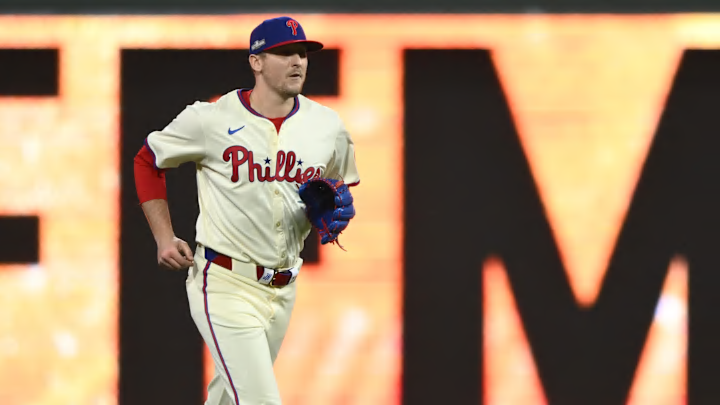The Philadelphia Phillies' 2024 season ended after the team was eliminated early in the NLDS by the New York Mets. The organization and the fans had high hopes for the team dating back to spring training, but the dream of winning a World Series will have to wait another year.
The Phillies won the NL East for the first time since 2011 and received a first-round bye in the playoffs. There’s been a lot of talk about whether or not the bye is beneficial to the top teams since those teams haven’t had much success after the extra time off in the previous three postseasons.
Phillies' inept offense topped only by bullpen's incompetence in NLDS elimination
The 3-1 series loss to the Mets wasn’t just one person’s fault. It wasn’t even just one of the offense’s, defense’s, pitching’s or coach’s fault. The Phillies first-round exit in the 2024 postseason was a collective team effort.
It could be argued which is more important in the playoffs: offense or pitching. Offenses face the league’s best pitchers in the playoffs, so the group might only muster one to three runs in a game. It’s up to the pitching to hold the opposing offense to fewer runs to help their team win.
The Phillies offense went cold except for the Game 2 victory. They scored seven runs in that win, but it took until the sixth inning for the bats to come alive. The Phillies were outscored by the Mets 23-12 in four games.
The pitching wasn’t much better, specifically the bullpen which posted an 11.37 ERA. The Phillies bullpen allowed 16 earned runs and 20 hits in 12 2/3 innings against the Mets. All-Star reliever Jeff Hoffman allowed two hits, one walk and three earned runs while picking up the loss in Game 1. The right-hander allowed one hit, one walk and was charged with three earned runs after Carlos Estévez allowed the go-ahead grand slam to Francisco Lindor that ultimately ended the Phillies season.
The Phillies other All-Star reliever, Matt Strahm, also struggled in the Division Series. The lefty allowed two hits, including a two-run home run to Mark Vientos to tie the game at six in the top of the ninth inning of Game 2.
Strahm finished the regular season with a 1.87 ERA and was nominated for All-MLB honors. He had an 18.00 ERA and a 2.00 WHIP in two innings pitched in the playoffs this year. Hoffman finished the regular season with a 2.17 ERA and was also nominated for All-MLB honors. He had a 40.50 ERA and 3.75 WHIP in 1 1/3 innings pitched in the playoffs. The Phillies couldn’t count on their two reliable arms when it mattered most.
Phillies high-powered, big-money offense went silent in NLDS
The Phillies star-studded lineup couldn’t get anything going throughout the series. The offense had a combined .186 batting average in this year’s playoffs. Bryce Harper had a .333 batting average and Nick Castellanos had a .412 batting average, but the rest of the offense went cold.
Kyle Schwarber, Trea Turner, Alec Bohm and J.T. Realmuto went 6-for-55 which is a .109 combined batting average. Other than his huge two-run triple in the eighth inning of Game 2 to give the Phillies a 5-4 lead, Bryson Stott went just 2-for-11 at the plate.
The most concerning part of the offense’s poor performance was the plate discipline. The Phillies were chasing pitches outside of the zone all series, and the Mets’ pitching took advantage of it. It’s tough to win baseball games, especially in the playoffs, when players aren’t making solid contact at the plate or getting on base.
The Phillies didn’t play to their standard, and they deserved to get sent home early because of it.
